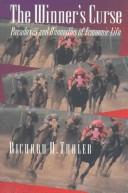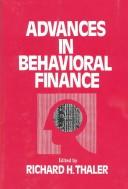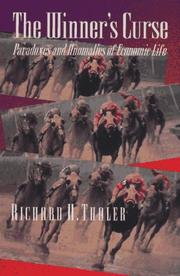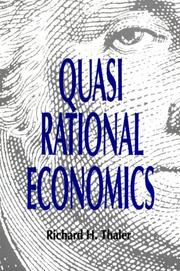| Listing 1 - 10 of 50 | << page >> |
Sort by
|
Book
ISBN: 9780393080940 9780393352795 0393080943 039335279X Year: 2015 Publisher: New York: Norton,
Abstract | Keywords | Export | Availability | Bookmark
 Loading...
Loading...Choose an application
- Reference Manager
- EndNote
- RefWorks (Direct export to RefWorks)
"Traditional economics assumes rational actors. Early in his research, Thaler realized these Spock-like automatons were nothing like real people. Whether buying a clock radio, selling basketball tickets, or applying for a mortgage, we all succumb to biases and make decisions that deviate from the standards of rationality assumed by economists. In other words, we misbehave. More importantly, our misbehavior has serious consequences. Dismissed at first by economists as an amusing sideshow, the study of human miscalculations and their effects on markets now drives efforts to make better decisions in our lives, our businesses, and our governments"--Amazon.com. Argues that economical trends cannot be predicted as much as thought, mainly because humans are so unpredictable, and reveals how behavioral economic analysis opens up new ways to look at everything from household finance to assigning faculty offices in a new building.
Cognitive psychology --- Mass communications --- behavioral sciences --- Economics --- Psychological aspects --- 330.00 --- Behavioral economics --- Behavioural economics --- Psychological aspects. --- Economische en sociale theorieën: algemeenheden. --- Gedragseconomie --- Economische en sociale theorieën: algemeenheden --- Economics - Psychological aspects

ISBN: 0029324653 Year: 1992 Publisher: New York Free Press
Abstract | Keywords | Export | Availability | Bookmark
 Loading...
Loading...Choose an application
- Reference Manager
- EndNote
- RefWorks (Direct export to RefWorks)

ISBN: 0871548445 0871548453 9780871548443 0691121745 0691121753 9780691121758 9780691121758 9780691121741 1282935542 1400829127 9786612935541 Year: 1993 Publisher: New York (N.Y.) : Russell Sage Foundation,
Abstract | Keywords | Export | Availability | Bookmark
 Loading...
Loading...Choose an application
- Reference Manager
- EndNote
- RefWorks (Direct export to RefWorks)
Investments --- Investissements --- Psychological aspects --- Aspect psychologique --- Psychological aspects. --- AA / International- internationaal --- 333.600 --- -332.6019 --- Investing --- Investment management --- Portfolio --- Finance --- Disinvestment --- Loans --- Saving and investment --- Speculation --- Financiële markten. Kapitaalmarkten (algemeenheden). --- 332.6019 --- Financiële markten. Kapitaalmarkten (algemeenheden) --- Investments - Psychological aspects --- Marché financier --- -Psychological aspects

ISBN: 0691019347 9780691019345 Year: 1994 Publisher: Princeton, N.J. : Princeton University Press,
Abstract | Keywords | Export | Availability | Bookmark
 Loading...
Loading...Choose an application
- Reference Manager
- EndNote
- RefWorks (Direct export to RefWorks)
Economics --- Paradoxes --- 330.1 --- -Paradoxes --- #SBIB:17H25 --- AA / International- internationaal --- 330.00 --- Economic theory --- Political economy --- Social sciences --- Economic man --- Economische grondbegrippen. Algemene begrippen in de economie --- Miscellanea --- Sociale wijsbegeerte: economische orde en arbeid --- Economische en sociale theorieën: algemeenheden. --- 330.1 Economische grondbegrippen. Algemene begrippen in de economie --- 83.00 economics: general. --- Economics. --- Paradoxes. --- Economische en sociale theorieën: algemeenheden --- Economie politique --- Miscellanées --- Economics - Miscellanea --- ECONOMICS --- ANOMALIES

ISBN: 087154847X 9780871548474 Year: 1994 Publisher: New York (N.Y.) : Russell Sage Foundation,
Abstract | Keywords | Export | Availability | Bookmark
 Loading...
Loading...Choose an application
- Reference Manager
- EndNote
- RefWorks (Direct export to RefWorks)
Book
ISBN: 9789047011620 Year: 2018 Publisher: Amsterdam Business Contact
Abstract | Keywords | Export | Availability | Bookmark
 Loading...
Loading...Choose an application
- Reference Manager
- EndNote
- RefWorks (Direct export to RefWorks)
Nobelprijswinnaar Richard Thaler vertelt in "Misbehaving' het verhaal van drie wetenschappers die in een gezamenlijke queeste de economie op haar kop zetten en vrienden werden voor het leven.Toen in de jaren zeventig economie als een harde wetenschap werd geprofileerd, rebelleerde een klein groepje wetenschappers hiertegen. Zij stelden dat er een belangrijk ding over het hoofd werd gezien in de economie: de mens. Thaler, Kahneman en Tversky legden de basis voor wat we nu de gedragseconomie noemen."Misbehaving' is een persoonlijk verhaal, doorspekt met prachtige anekdotes en leerzame voorbeelden uit het dagelijks leven. De leukste manier om iets te leren over gedragseconomie. Bron : http://www.bol.com
economie --- gedragseconomie --- Gedragseconomie --- Economie --- Psychologie van de consument --- Consumptiegedrag --- Consumentengedrag --- Koopgedrag --- Consumentenpsychologie --- 340 --- politieke economie --- Nobelprijs economie --- menselijk gedrag --- économie --- Economic sociology --- Economics --- consumentengedrag
Book
ISBN: 9781846144035 Year: 2015 Publisher: [S.l.] Allen Lane
Abstract | Keywords | Export | Availability | Bookmark
 Loading...
Loading...Choose an application
- Reference Manager
- EndNote
- RefWorks (Direct export to RefWorks)
Book
ISBN: 9780241951224 Year: 2016 Publisher: Place of publication unknown Penguin Books
Abstract | Keywords | Export | Availability | Bookmark
 Loading...
Loading...Choose an application
- Reference Manager
- EndNote
- RefWorks (Direct export to RefWorks)
With relatable examples from everyday life investments, household spending to television game show dilemmas and the NFL draft, Misbehaving offers a present-at-the-creation account of Thaler s battle to upend traditional economic thinking. As readable as Freakonomics, as provocative as Thinking, Fast and Slow, Misbehaving is a singular look into profound human foibles one that will have readers retooling their grocery lists and retirement strategies, and lead managers to rethink every aspect of their business.
Book
ISBN: 0871548461 Year: 1991 Publisher: New York : Russell Sage Foundation,
Abstract | Keywords | Export | Availability | Bookmark
 Loading...
Loading...Choose an application
- Reference Manager
- EndNote
- RefWorks (Direct export to RefWorks)
Book
ISBN: 9780753556535 9780753556542 0753556537 Year: 2015 Publisher: London: Allen,
Abstract | Keywords | Export | Availability | Bookmark
 Loading...
Loading...Choose an application
- Reference Manager
- EndNote
- RefWorks (Direct export to RefWorks)
Every day we make countless decisions, from the small, mundane things to tackling life’s big questions, but we don’t always make the right choices. Behavioural scientist Dr David Halpern heads up Number 10’s ‘Nudge Unit’, the world’s first government institution that uses behavioural economics to examine and influence human behaviour, to ‘nudge’ us into making better decisions. Seemingly small and subtle solutions have led to huge improvements across tax, healthcare, pensions, employment, crime reduction, energy conservation and economic growth.Adding a crucial line to a tax reminder brought forward millions in extra revenue; refocusing the questions asked at the job centre helped an extra 10 per cent of people come off their benefits and back into work; prompting people to become organ donors while paying for their car tax added an extra 100,000 donors to the register in a single year. After two years and dozens of experiments in behavioural science, the results are undeniable. And now David Halpern and the Nudge Unit will help you to make better choices and improve your life
| Listing 1 - 10 of 50 | << page >> |
Sort by
|

 Search
Search Feedback
Feedback About UniCat
About UniCat  Help
Help News
News